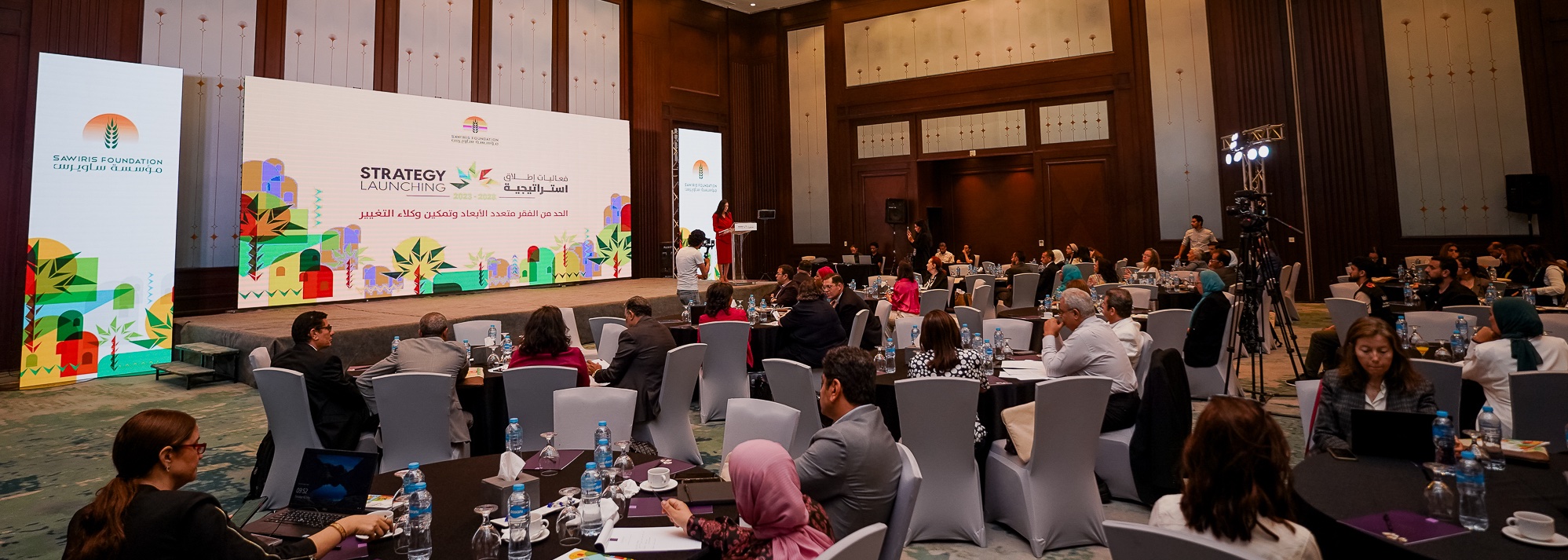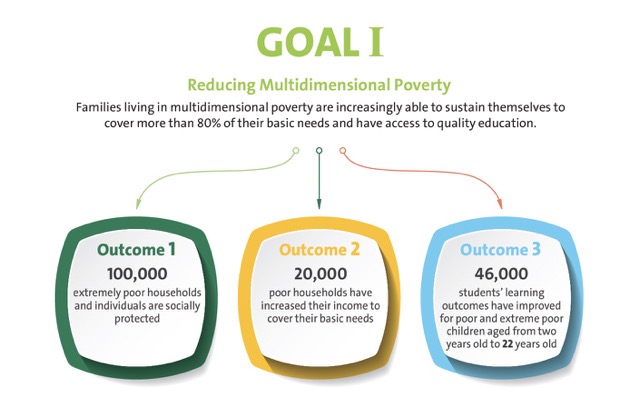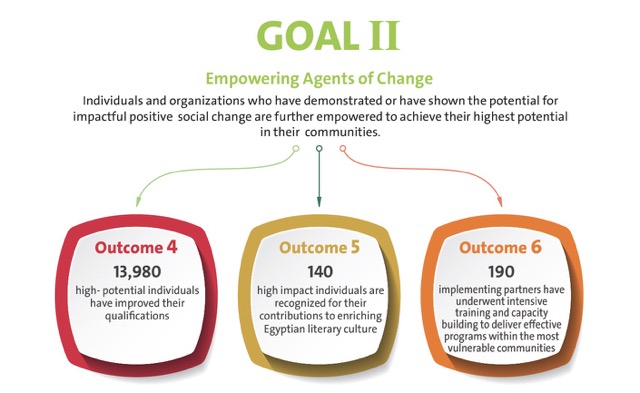
The choice of a funding organization as to where it will direct its resources is crucial and hence our strategic directions allow us to reflect these fundamental decisions within Sawiris Foundation’s funding and work cycles. How do we decide what is important and what is not? What projects are proving successful? Is this a priority for us now? How can we best monitor and evaluate the most effective use of our resources?
In our attempt to answer these questions, Sawiris Foundation (SFSD) has embarked on a two-year journey of developing its five-year strategy from July 2023 to 2028. Our strategy was launched earlier this June and shared with our partners, colleagues, and stakeholders in the field and has now started implementation. You can watch the Strategy Launching recap video and the events panel sessions here.
Tailoring SFSD’s new strategic directions, the foundation has led a participatory approach through consultations with our implementing and co-funding partners, other stakeholders as well as researchers. Moreover, we have set our priorities through a reflection of our previous successes and failures, reviewing evidence of global interventions, assessing the current needs and situation of the Egyptian context, as well as collecting and analyzing data from ongoing projects to extract learnings.
SFSD commits to full transparency in its strategy on the grounds of accountability, openness, and continuous learning. We put great emphasis on collaboration, impact, and agility, through an evidence-based and open strategy.
An open and evidence-based strategy
Sawiris Foundation builds its strategy on two important pillars: being evidence-based and agile.
An agile strategy allows us to act and adapt quickly and allows for flexibility. Being agile has become a requirement in our ever-changing world. Organizations need to be responsive to the changes that are happening around them. That being said, Sawiris Foundation lays out its priorities, however, remaining aware and ready to revisit these when needed according to new data, findings, and global challenges.
With regular evaluation of our program’s impact and review of our priorities, we commit to supporting various innovative projects and commissioning several impact evaluations, as we are accountable to act upon findings, lessons, and even learning from failures. Moreover, in times of uncertainty and ever-changing social, economic, and political circumstances, the poor communities we serve are in dire need of agile support. This may cause priorities to shift in front of unexpected shocks. SFSD is therefore committed to allocating efforts and resources in support of those on whom shocks inflict substantial losses and push them into a deeper state of poverty.
Monitoring and evaluation efforts are crucial in answering the question: “What do we fund?” and the reply can be as simple as .... we fund what works. Within the foundation, this translates to: we fund what has shown a positive and significant impact on beneficiaries. By collecting and analyzing data, needs assessment, and implementation of projects, we are able to direct our funding efficiently and ensure, in pure business terms, a better return on investments or what we prefer, calling more “social Impact”. Moreover, this scientific approach to funding sustainable development allows donors better possibilities of scaling up and achieving even greater impacts.
Reducing Multidimensional Poverty and Empowering Agents of Change

“Poverty is more, much more than just not having enough money [...] poverty is a situation” (Brunswick, 2009)
Sawiris Foundation decided to look beyond traditional measures of poverty (monetary) and instead has taken up the Multidimensional Poverty Index as its reference. This index captures the various dimensions that contribute to the situation of poverty: education, health, housing, basic services, employment, and others. Therefore, throughout economic and social empowerment programs as well as education interventions, SFSD aims to tackle various indicators of the MPI and thus reduce its intensity and headcount by 2028.
Through Social Empowerment efforts, the focus is set on the “extremely poor” households and individuals. In that, the foundation supports efforts directed towards Children Without Parental Care, Provision of Basic Services, and Graduation of Extreme Poor out of Poverty.
Economic empowerment is addressed by two main programs: high-quality training programs and supporting small businesses through microfinance (Loans & Grants) with the goal of increasing or providing income to beneficiaries. In that aspect, SFSD commits to conducting several microfinance evaluations to identify the most efficient products for the “poor”.
Additionally, education - where deprivation from it is an essential dimension of poverty - aims to improve learning outcomes and focuses on the quality of education by enhancing enabling inputs and providing scholarships based on needs. It also aims to tackle negative perceptions and societal reluctance toward pre-primary education and TVET education through awareness efforts.

Agents of change can be individuals as well as organizations, those who have the potential for positive social change. Therefore, investing in these agents and fostering opportunities that equip them to face Egypt’s contemporary socioeconomic challenges is of utmost importance.
Egyptians face many barriers to achieving higher education and furthering high-quality learning opportunities; these can be financial, cultural, or due to high competition. Through scholarship programs, SFSD aims to facilitate access to quality higher education as well as provide executive education opportunities to champion civil servants.
Moreover, in the cultural scene, SFSD reiterates its commitment to recognize and promote emerging writers enriching Arabic literature through their works. Through the Sawiris Cultural Award, we shed light on these creative writers and offer them greater opportunities and a pedestal to expand their readership beyond Egypt and more into the Arab world.
Last but not least, the Sawiris Foundation has been supporting and working with non-governmental organizations (NGOs) since its establishment and, therefore, has become familiar with their capacities and challenges. NGOs are a pillar of our society, providing countless services to the Egyptian population and representing hundreds of marginalized communities. Therefore, SFSD makes it a priority to invest in them, to support a healthy ecosystem for civil work, and to strive together towards efficiency. We look forward to continuously improving the capacities of civil work to meet, adapt to, and face the challenges of the evolving development field.
Conclusion:
Sawiris Foundation is committed to investing in initiatives that deliver meaningful outcomes, foster long-term, sustainable change, and remain responsive to the circumstances around us. Through rigorous evaluation, strategic grantmaking, and continuous learning, we will optimize our resources to achieve the greatest social return on investment. With this new strategy, we embark upon a path that will further elevate our efforts, enabling us to tackle these challenges with renewed vigor and purpose.
That being said, collaboration lies at the heart of our strategy, and we recognize that the most significant achievements are accomplished through partnerships—bridging the gaps between sectors, leveraging diverse expertise, and forging alliances to create lasting change. By pooling our resources, knowledge, and experiences, we will amplify our collective impact and co-create transformative solutions to the complex problems we face.
Patricia is the Strategy Officer at Sawiris Foundation and has taken a key part in leading the exercise of compiling information and developing the new strategy. Patricia holds an undergrad in Public Administration from the Erasmus University of Rotterdam and continues to be passionate about translating research into policy to serve the Egyptian people more efficiently.
